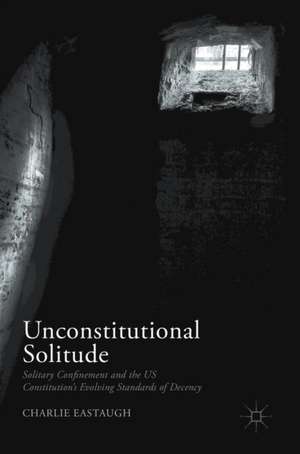Unconstitutional Solitude: Solitary Confinement and the US Constitution’s Evolving Standards of Decency
Autor Charlie Eastaughen Limba Engleză Hardback – 23 oct 2017
Despite significant reforms to capital sentencing by the executive and legislative branches, Eastaugh shows how the American prison system as a whole has escaped meaningful judicial oversight. Drawing on a wide range of socio-political contexts in order to breathe meaning into the moral principles underlying the punishments clause, the study includes an extensive review of professional (medico-legal) consensus and comparative transnational human rights standards united against prolonged solitary confinement.Ultimately, Eastaugh argues that this practice is unconstitutional. An informed and empowering text, this book will be of particular interest to scholars of law, punishment, and the criminal justice system.
| Toate formatele și edițiile | Preț | Express |
|---|---|---|
| Paperback (1) | 416.54 lei 6-8 săpt. | |
| Springer International Publishing – 30 aug 2018 | 416.54 lei 6-8 săpt. | |
| Hardback (1) | 698.15 lei 6-8 săpt. | |
| Springer International Publishing – 23 oct 2017 | 698.15 lei 6-8 săpt. |
Preț: 698.15 lei
Preț vechi: 821.35 lei
-15% Nou
Puncte Express: 1047
Preț estimativ în valută:
133.59€ • 139.83$ • 111.19£
133.59€ • 139.83$ • 111.19£
Carte tipărită la comandă
Livrare economică 31 martie-14 aprilie
Preluare comenzi: 021 569.72.76
Specificații
ISBN-13: 9783319617343
ISBN-10: 3319617346
Pagini: 233
Ilustrații: XVIII, 233 p.
Dimensiuni: 148 x 210 mm
Greutate: 0.45 kg
Ediția:1st ed. 2017
Editura: Springer International Publishing
Colecția Palgrave Macmillan
Locul publicării:Cham, Switzerland
ISBN-10: 3319617346
Pagini: 233
Ilustrații: XVIII, 233 p.
Dimensiuni: 148 x 210 mm
Greutate: 0.45 kg
Ediția:1st ed. 2017
Editura: Springer International Publishing
Colecția Palgrave Macmillan
Locul publicării:Cham, Switzerland
Cuprins
Chapter 1. The Hidden Corner of the Prison.- Chapter 2. An Adjudicative Framework: Morality and the Punishments Clause.- Chapter 3. The Eighth Amendment’s Evolution.- Chapter 4. National Consensus by State Counting.- Chapter 5. Proportionate Penology.- Chapter 6. Transnational Law.- Chapter 7. Professional Consensus.
Notă biografică
Dr Charlie Eastaugh is a Visiting Fellow at the University of Surrey School of Law, UK.
Textul de pe ultima copertă
This book examines American solitary confinement – in which around 100,000 prisoners are held at any one time – and argues that under a moral reading of individual rights such punishment is not only a matter of public interest, but requires close constitutional scrutiny. While Eighth Amendment precedent has otherwise experienced a generational fixation on the death penalty, this book argues that such scrutiny must be extended to the hidden corners of the US prison system.
Despite significant reforms to capital sentencing by the executive and legislative branches, Eastaugh shows how the American prison system as a whole has escaped meaningful judicial oversight. Drawing on a wide range of socio-political contexts in order to breathe meaning into the moral principles underlying the punishments clause, the study includes an extensive review of professional (medico-legal) consensus and comparative transnational human rights standards united against prolonged solitary confinement. Ultimately, Eastaugh argues that this practice is unconstitutional. An informed and empowering text, this book will be of particular interest to scholars of law, punishment, and the criminal justice system.
Caracteristici
Argues that solitary confinement, as practiced in the United States, is unconstitutional under the evolving standards of decency that mark the progress of a maturing society Combines professional (medico-legal) consensus with comparative legal standards found in UN instruments and regional human rights systems Uses moral theory to frame a practical, constitutional attack on solitary confinement
